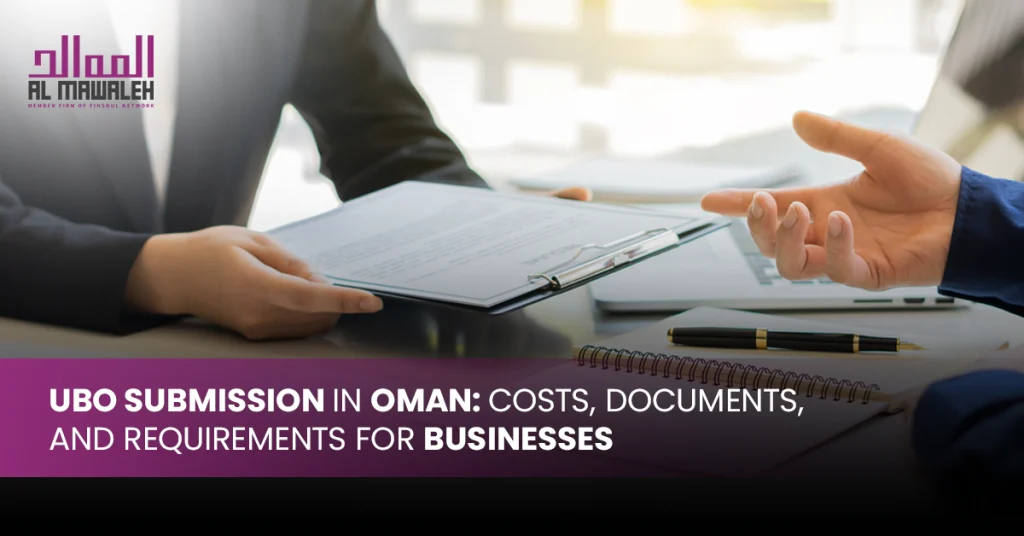- Welcome to Al-Mawaleh
- Majan building , Opposite CSK cafe ,Ghala,Muscat Governorate,Sultanate of Oman

If you’re running a business in Oman, 2025 brings sharper scrutiny and stricter expectations around UBO Submission 2025. The Ministry of Commerce, Industry and Investment Promotion (MoCIIP) has rolled out updated regulations that demand full transparency of ownership structures. Whether you’re launching a new company or managing an existing one, failing to declare your ultimate beneficial ownership could mean fines, delays—or worse, reputational damage that could affect client trust, investor confidence, and even your ability to operate smoothly.
For many companies, these requirements may feel like an additional layer of bureaucracy, but in reality, UBO compliance has become a cornerstone of good corporate governance. It strengthens market integrity, builds investor confidence, and helps Oman align with international standards that fight tax evasion, money laundering, and hidden ownership schemes. Global partners and banks increasingly expect businesses to meet these standards, which means UBO compliance isn’t just about avoiding penalties—it’s about proving your company is trustworthy and sustainable in the long term.
Let’s break down what you need to know to stay compliant, avoid penalties, and keep your business reputation intact with Al Mawaleh.
Under Ministerial Decision No. 424/2023, all commercial companies in Oman—except public joint-stock companies—must maintain a UBO register. This requirement applies across sectors, from small family-run businesses to large multinational subsidiaries operating in Oman. It includes:
If no individual meets the 25% threshold, the company’s highest-ranking officer—often the CEO, managing director, or board chairman—is considered the ultimate beneficial owner by default. This ensures that every company in Oman has a clear, accountable individual who can be identified as the person in control.
To complete your ultimate beneficial owner declaration, you’ll need to provide a comprehensive set of documents. These include:
All records must be maintained accurately and retained for at least 10 years—even after dissolution or liquidation of the company. This long retention period emphasizes the seriousness with which authorities view ownership transparency, ensuring that historical records can be audited if suspicions arise in the future.
UBO data isn’t a one-time submission. Companies must renew and update their UBO information annually or whenever significant corporate events occur, such as:
Failure to comply with UBO Renewal Oman requirements can result in escalating fines, public disclosure of non-compliance, and even suspension of commercial registration, which may disrupt contracts, banking relationships, and day-to-day operations.
While the government itself doesn’t impose a direct fee for UBO submission, businesses often face costs associated with ensuring accuracy and legal validity. These costs typically arise from:
In many cases, these costs are small compared to the risks of non-compliance, which can lead to penalties far exceeding the expense of professional support. At Al Mawaleh, we offer tailored ultimate beneficial ownership services in Oman, helping businesses simplify the process, stay organized, and meet every requirement without stress.
Oman’s push for corporate transparency is part of a global movement to combat financial crime and promote ethical business practices. With UBO Submission 2025 now a legal obligation, companies must act swiftly, accurately, and proactively to meet deadlines and avoid unnecessary risks.
The reality is that transparency is no longer optional—it is the foundation of trust in today’s corporate landscape. By complying with UBO and renewal rules, businesses in Oman not only avoid penalties but also strengthen their credibility with regulators, partners, and customers.
Need help navigating the process? Al Mawaleh’s experts are here to guide you through every step—from form preparation and ownership mapping to annual renewal—so your business stays compliant, credible, and fully audit-ready in 2025 and beyond.
📞 Contact Al Mawaleh today at +968 7733 8545
🌐 Visit: https://mawaleh.com
Al Mawaleh is a leading financial consultant company in Oman, delivering expert accounting services, professional auditors, and trusted financial solutions advisor support for businesses through top financial consulting firms expertise.